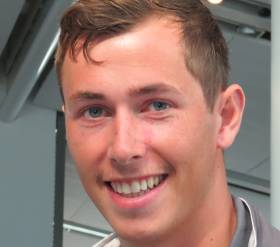Displaying items by tag: Andy Harrington
Doyle and Byrne Form Winning Combination at Ireland Rowing Trial
#Rowing: The double of Philip Doyle and Ronan Byrne performed brilliantly for Ireland last year, culminating with a ninth-place finish at he World Championships. They took up where they left off at the the Ireland Trial at the National Rowing Centre today. The heavyweight crew beat the lightweight double of Paul O’Donovan and Fintan McCarthy in a fine race in the first session. McCarthy and O’Donovan had never raced together before, but still finished well and were just over four seconds behind Doyle and Byrne in dead calm conditions.
Some of the contests in this first of two sessions were handicapped to produce good racing and it worked. Sanita Puspure did not win her race but had a very good time, while the pair of Aifric Keogh and Monika Dukarska won in another impressive time.
The new junior coxed four of John Kearney, Jack Dorney, James O’Donovan and Matthew Gallagher, with cox Leah O’Regan were just pipped in their race – but again excelled in terms of time for this boat.
One of the more interesting crews to be trialled was the senior four of Eimear Lambe, Aileen Crowley, Emily Hegarty and Claire Feerick. Another four was to be trialled in the second session. This opens up a possibility of a single, a pair and a four going forward on the women’s heavyweight side.
The combination of Rory O’Neill of Castleconnell and Finn O’Reilly of Skibbereen were the top men’s junior double.
#Rowing: Three of the four Ireland boats in early action at the World Cup Regatta in Lucerne qualified directly from their heats and avoided repechage action.
Shane O’Driscoll and Mark O’Donovan took second place in their heat of the men’s pairs and secured a place in the quarter-finals. The world lightweight champions came up against the outstanding Sinkovic brothers from Croatia, who won the race with a sparkling performance. The key battle behind them was not to finish last. Brazil and Australia battled with Ireland, but O’Donovan and O’Driscoll moved away from both, collared second place and held on to it.
Patrick Boomer and Andy Harrington secured third place in their heat. Their qualification looked in doubt as they battled with Croatia at the back of the field. But the big Ireland crew found speed when they needed it. They produced the fastest final quarter, and left the Croats behind them. China faded badly and took the last place.
The women’s double of Monika Dukarska and Aileen Crowley qualified directly for the A/B Semi-Finals with a solid second place. The United States crew of Megan O’Leary and Ellen Tomek were convincing winners, while Dukarska and Crowley held on to second despite a late charge by China, who pushed Switzerland into the repechage.
In the women’s pair, the new crew of Aifric Keogh and Tara Hanlon finished sixth in their heat and are set for a repechage.
World Cup Regatta, Lucerne, Day One (Irish interest; selected results)
Men
Pair – Heat Two (First Four to Quarter-Final; rest to Quarter-Final or E Final): 1 Spain 6:40.29; 3 Ireland Two (P Boomer, P Harrington) 6:45.74
Heat Six (First Three to Quarter-Final; rest to Quarter-Final or E Final): 1 Croatia 6:37.66, 2 Ireland One (M O’Donovan, S O’Driscoll) 6:40.95.
Women
Pair – Heat Two (First to A Final; rest to Repechage): 1 Canada 7:13.98; 6 Ireland (A Keogh, T Hanlon) 7:32.49.
Double Sculls – Heat Two (First Three to A/B Semi-Finals; rest to Repechages): 1 United States 6:58.58, 2 Ireland (A Crowley, M Dukarska) 7:03.05.
























































